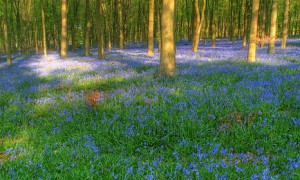It was a quiet news morning in London on Monday, April 8, 2013. Just the sort of time for the newspapers and the broadcast media to pick up the publication of a very important report, concerning the whole of Britain’s land and natural resources.
And then, boom. Mrs Thatcher’s death was announced at noon, and almost everything that didn’t concern her was axed from the news list. That included this report from the Natural Capital Committee (NCC), commissioned by the UK government, even though illustrating its points would have been very easy on television.
I’m sure of that because the only reference I could find on the news section of Google, under the heading “UK failing to protect natural capital – report” was on the Responding to Climate Change website, written by Ed King. They used a picture of one of the most popular floral events of the year in this country, a sea of bluebells in the woods in May.
Bluebells are an enormous attraction. They actually cause traffic jams when they are out, in the National Trust’s Ashridge estate near where I live. That’s one of Britain’s 10 top bluebell sites, which draw visitors like bees to the honeypot, although that’s a rather unfortunate metaphor these days, and is again relevant to this story.
That photograph of vivid blue is something many people can instantly relate to. The Ashridge site (and I suspect most other bluebell locations too) are free to visit, and the only way you can put an economic value on them is if you factor in what people might spend at the excellent nearby National Trust tearooms.
Yet if you put it to people that one day, because of environmental changes, those bluebells might diminish or disappear altogether, they would be – and I don’t think this is exaggerating – dismayed. They’re clearly a very important asset, a very good example of Britain’s “natural capital”, even if they have next to no monetary value. Would people be willing to pay to keep them there? If a way could be found, I think they would. Better still, of course, if a government came up with joined-up policies to keep them there, rather than pursuing economic prosperity in isolation (and possibly to their detriment, through more CO2 emissions due to growth, for example).
The report, which, because of it’s very unfortunate publication date, very few people will be aware of, addresses this issue head-on, and concludes that the UK government is not doing enough.
As RTCC sums up the report’s damning assessment: “The UK is failing to protect its natural assets and has no integrated means of measuring the economic or social value of its ecosystems.”
The Natural Capital Committee report defines “natural capital” as the land, water and the atmosphere together with the functions or ecosystem services these provide, such as the water cycle and soil fertility. It also includes geological resources such as mineral deposits and fossil fuels.
It warns the value of fresh water, clean air, wildlife and other natural resources are not taken into account when calculating economic prosperity.
My local bluebells themselves aren’t under any immediate threat. The land is owned by the National Trust, and is inalienable. But there is an indirect threat, to the bees and insects that pollinate the bluebells, and to the climate that triggers their emergence at just the right time and in the glorious profusion people come to expect.
The report concludes that climate change is expected to lead to greater numbers of alien species and diseases moving through the UK, affecting trees, plants and wildlife.
It goes on to say that “degraded natural capital” will ultimately stop development and progress, and says it must be “integrated” into indicators such as national income and policy decisions.
Back to that very visual example of the bluebells. The Natural Capital Committee notes a recent KPMG report that estimated the loss of the pollination services from bees in Britain would cost the UK economy £1.8 billion a year. Bees are in steep decline, and there are widespread calls for cuts in the use of certain pesticides. According to wiki.answers.com bluebells are capable of self pollination, but bees are certainly one of the pollinators.
NCC chairman Dieter Helm said: “Our economic prosperity and the wise use of our natural resources are not mutually exclusive. In fact, the latter is a precondition of the former, in both the short, medium and long-term.”
The report concludes that the UK government should take a lead on linking economic prosperity and natural resources as a matter of urgency.
“It is critical that changes in [natural resources] are properly accounted for in our national accounts so that this information can feed quickly into policy making,” it says.
“The work led by the Office for National Statistics (ONS) to include natural capital fully in the UK’s Environmental Accounts should be given the greatest possible support by Government.”

